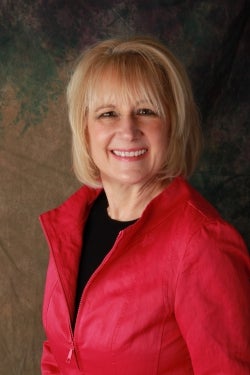Deborah Gillotti, A&S, Economics 1977

Debbi Gillotti earned her Bachelor of Arts in Economics and History from the University of Pittsburgh in 1977, A Master of Science in Accounting from Georgetown University in 1981 and a Director Certificate in the Women’s Director Program in 2002 from Northwestern University’s Kellogg School of Management. Debbi recently was awarded the Distinguished Alumni Fellow in partnership with the Pitt Alumni Association and the Office of the Chancellor. Debbi is the Chief Operating Officer at nVoq, Inc. and a Member of the Board of Trustees for the University of Pittsburgh. Read more about Debbi below:
Q. How did you decide on the University of Pittsburgh and your majors in Economics and History? Did you have any favorite classes in Economics?
I was attracted to Pitt’s breadth of offerings and at the time, its relative affordability compared to other schools I was considering. I was unsure of a major upon arriving at Pitt but came with quite a few college credits in History courtesy of several Advanced Placement classes I’d taken in high school. So getting a history degree was a no-brainer. When I attended college in the 70’s, the economy was having major issues “Stagflation” and was front page news, not unlike today. I took an intro to Econ class and liked it, so that became my primary focus. My favorite Econ classes were Macroeconomics, Statistics and Consumer Economics (the latter taught by the legendary Dr. Reuben Slesinger). I also had the benefit of working one summer in the Economics Department for Dr. Richard Thorn who was the chairman at that time. Dr. Thorn helped me get my first job post-college at the International Monetary Fund and I’ve never forgotten his kindness in doing so.
Q. How has your undergraduate degree helped prepare you for your illustrious career? What skills did you learn that you still use in your career?
I would say the most useful courses for me were statistics and consumer economics, which was more business/marketing focused. (At the time Pitt did not offer an undergrad business degree).
Q. You have had many leadership roles in your career with Duracell, Starbucks Coffee Company, Microsoft, among many others, including your current position at nVoq, Inc. How have you felt prepared to take on these leadership roles? What is your leadership style? And what are some of the hardest decisions you have had to make as a leader?
I think being a sponge in early stages of my career to observe and experience good or bad management behaviors helped me figure out first what NOT to do. And over time you build skills and confidence in your ability to read a situation and react accordingly with hopefully the right outcomes. I can’t say I’ve walked into every new opportunity feeling totally prepared – you always have new things to absorb – but being a quick learner and flexible in approach is helpful. You learn from your mistakes – we’re all human as leaders – and from your people. Don’t ever assume you have all the answers and don’t be afraid to hire people more capable than yourself. I would say my style over the last decade at nVoq especially has been very delegative as I prepare the next generation of talent for our company. I’m there to guide them and mentor where needed but it’s really rewarding to see them flourish as a team.
Probably the hardest decisions I’ve had to deal with is closing down and departing an unsuccessful business venture. It’s not fun and it hurts even if it’s beyond your control. You hope everyone will land on their feet and you feel for everyone who tried their best.
Q. What has it been like for you in a C-Suite position? What advice do you have for those pursuing that path? What are the skills that you recognize that are beneficial to have to be in a C-Suite position?
My initial aspiration was to become a Chief Information Officer. I could have continued along that career path, but decided I really was more interested in running a business and general management. In order to credibly do that, I had to take a big step backward career-wise and that isn’t for everyone. But it was a calibrated risk, and the reward was that I not only learned the skills I was lacking, but I can offer the unique vantage point of having been a C-suite customer. My advice to those looking to pursue the C-suite is to map out a progression of roles that help you build the skills you need for the specific role you’re targeting. Get a mentor in that discipline who can help you identify what specialized training or experience you may need to advance. Skills in finance, accounting and managing a P&L are always desirable no matter what field you pursue. While applied skills are of course important, I look to hire leaders who have the “EQ” component – they are not only accomplished in their own right, but they have a successful track record of developing talent, have great communication, empathy and people skills in addition to functional expertise.
Q. What was a favorite memory from your days at Pitt?
Many good times on the 12th floor of Tower C were had! Pitt winning the national college football championship in 1976-77 was special.
Q. What advice do you have for Economics majors today?
Don’t worry if you haven’t landed on a specific career path Day 1. By taking the various course work in your major you’ll hopefully find a particular discipline that resonates – for me it was macro and consumer economics which led to more interest in general business.
Q. Anything else you’d like to share?
Thank you for having me! I wish you all the best and please reach out if I can be of help to anyone.
